Months on from Protest No Progress on Perivale HMOs
Homeless people placed in Medway Village back residents' opposition
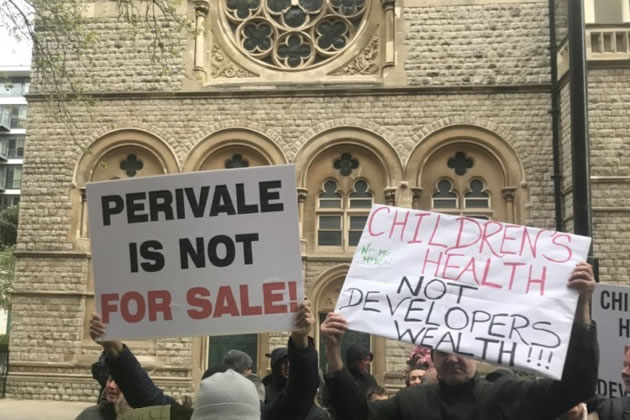
Protest this April against HMOs in Perivale outside Ealing Council.
July 29, 2024
Echoing across the forecourt of Perceval House is the collective anger of nearly a hundred residents of Perivale. Ealing Council’s building is hit with a barrage of furious slogans carried by a mass of outraged voices who declare that enough is enough.
The issue they gathered to protest on that rainy afternoon was the proliferation of houses of multiple occupancy or HMOs. They hurl chants like “No more HMOs”, “Say ‘no’ to HMOs” and “Perivale is not for sale”.
Residents decry what they view as the greed of opportunistic landlords, a council that seems to lack transparency and a system that seems designed to allow neighbourhoods to be converted into rental farms with very little oversight. They fear that the problem, which has already seen the steady disintegration of their tight-knit community, will accelerate until there is nothing left.
Over the course of several months, the LDRs spoke to homeowners and HMO tenants about their experiences. Concerns about crime, drugs, violence and vulnerable people were raised by all sides of the HMO divide, with the veneer of the quiet suburban area hiding some shocking stories that have left many traumatised or looking to leave Perivale altogether.
On 3 April , Ealing Council’s Community Protection Officer Jess Murray sits in front of a group of Medway Village residents. Medway has been one of the areas of Perivale that has seen an ever-increasing number of HMOs popping up over the years.
The problem has become such a concern that residents say they dread seeing a for sale sign on the estate with some even going to ask their departing neighbours not to sell to HMO landlords but to families. As the council officer sits there, the church where the meeting is held begins to fill, then overflow.
It becomes increasingly apparent that the residents are furious. The meeting is raucous. Insults are thrown, demands are made, Medway is a community hurting from a loss of identity, and the once safe haven at the edge of London is now something quite different.
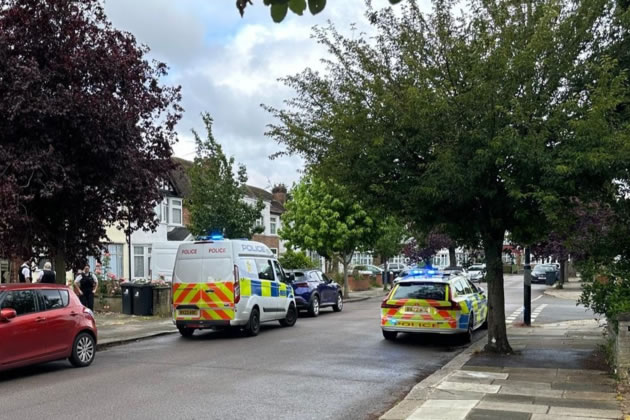
The police are seen regularly on the Medway Estate. Picture: Medway Resident
Speaking passionately about one worrying incident where armed police were called, an incensed resident said to rapturous applause at the meeting, “There were a dozen or so officers, I was walking with my grandchildren [on the estate]. These armed officers were running in regard to a firearms incident that had been reported at one of these HMOs on the street down from us.
“The reality I took from that was that I could have got a stray bullet or my grandchild could have got a stray bullet. It is not a joking matter, it is not a laughing matter. We don’t want to hear from yourselves nice political speak.”
During the meeting, more angry residents take the mic to share their own stories of violence, drugs and anti-social behaviour and every time Mr Murray addressed the room the temperature rose. There were demands for the council and police to lay out a plan to stop HMOs from taking over the area.
Mr Murray said he could not promise anything concrete. From his research, he said that the most up-to-date figure on the number of registered HMOs on the estate was 28 but admitted there could be many more unregistered or unlicensed – going against what they are legally required to do.
In response to demands to stop them, he said there was little the council could do and could not revoke HMO licences. He explained for dangerous or unruly tenants the council can do nothing more than send a strongly worded letter to the private landlord.
When asked if the council knew how many potentially dangerous or vulnerable people were being placed in HMOs Mr Murray said, “I’ve said this about five times, the council has not placed, from a temporary accommodation perspective, people into multiple occupancy housing.” He also denied the council were aware of who or how people were being placed in HMOs. The meeting ended with enmity.
In the weeks and months since, the LDRS has spoken to a number of people who were there that night about their individual experiences. Adrijana (whose name has been changed to protect her identity) lives next to a HMO with her husband and two children.
She said, “The trouble started the first week [the HMO opened] in March 2022. Our car got broken into. Before that, we never had any issues and we have lived in the area for the past 21 years.
“There are too many incidents that I care to remember but, we have been through domestic abuse next door, possible stabbings, fights and much more. It got so bad that my children thought at one point that me and my husband were fighting [when it was actually coming from the HMO next door]. That’s how loud it was. They could hear it through the walls and they got so scared.
“It sounded like a woman was being thrown across the room and into our shared wall. I could hear the thud, the scream and I could hear her asking for help.” Adrijana called the police, who visited to reassure her children as well as visit the HMO. Adrijana said her children were left so traumatised by the experience they have refused to sleep on their own since and share a bed with their parents.
The noise coming from the HMO isn’t always so disturbing but can be equally disruptive. Adrijana says there is “loud music 24/7” meaning her family is constantly sleep-deprived. It got so bad that the mum of two said she quit her job and began sleeping in her car parked in a supermarket car park during the day just to get some rest.
She says she has also faced personal harassment by men who gather outside the HMO. The smell of drugs emanating from the property is ever present she claims, with Adrijana saying that doctors believe the smoke had a role to play in her son’s recent asthma diagnosis.
Adrijana is just one of the many residents who came forward to share her story with the LDRS. Susan [whose name has also been changed], said she is considering moving despite moving to the area because of its “excellent reputation” only a few years ago.
Susan said, “Before we purchased the house things were very different, so things have declined rapidly. For us, it has become particularly bad in the last year or so.” For Susan, this decline reached its nadir just two days before Christmas last year, when her family returned home from a Christmas market to be chased inside their home by two masked men.
She said, “When we got near to our house we heard this man [who turned out to be someone living in a HMO] shouting for help and asking us to call the police.” Her husband found out he was being chased and two masked men on electric bikes appeared.
“They pull out the machetes, this guy and my husband run into the house and we close the door and they are macheting the door,” Susan added. “My kids were screaming, everybody was screaming.”
When asked if she thought the incident was connected to the increasing proliferation of HMOs in the area, Susan said, “It is not the problem of the HMOs [in of themselves] it is the crime that is being brought to the area.
“HMOs attract crime,” she said, adding, “I think it is a result of it, it is a consequence of HMOs. [Perivale} is easy picking for a gang, it is still mainly old people and families living here.” Susan says she witnesses drug deals going on almost every day in the field out the back of her house, something that she says she never saw a year ago.
Agata and Sylwester Michalewicz also have had their own harrowing experience. Living next to a HMO near the centre of Medway Village, the couple say they believe their cat was shot with an air gun by someone living there at the time.
Sylwester said: “One day the cats don’t want to go outside anymore and one of the cats had something on its side. Builds up, bursts, builds up, burst, this was the third time.” He adds that at the same time he found an air gun pellet in the garden.
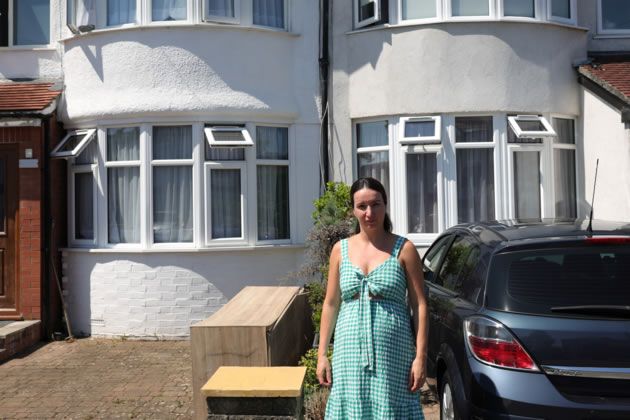
Agata Michalewicz. Picture: Facundo Arrizabalga/MyLondon
“We think they were shooting the at cat,” he claimed. “There is no other way [the pellets would be in the garden]. We had to take her to the vet. Now we are scared to let our daughter go and play in the garden.”
He describes how the HMO has ‘ruined’ his hopes of a quiet family life. “Loud noises, parties,” he described the constant behaviour he and his wife deal with.
“We cannot sleep, we cannot rest, we cannot enjoy the property we worked all our lives to buy. We bought the property in 2016, it took me 13 years to save enough money for the deposit same with my wife, so pretty much all our plans have been ruined.”
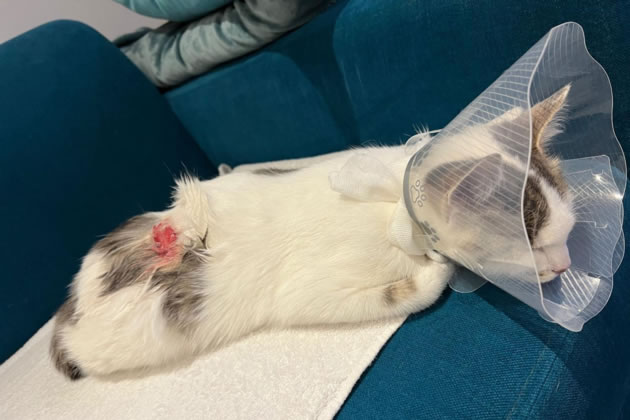
The family's cat after it was shot by an airgun. Picture: Agata Michalewicz
The LDRS interviewed countless residents who cited concerns around women’s safety, child safety due to there being a school on the Medway Village estate, their concerns on the impact on property prices and damage to the community.
There were numerous reports of a man from one of the HMOs flashing schoolchildren from his bedroom window, although the LDRS has not had this incident confirmed by police. Met Police Inspector Anil Sharma said, “We are not aware of any indecent exposure in Medway Village and we would encourage anyone who has witnessed a crime to report this to police immediately on 101 or via the online reporting platform; in an emergency they should call 999.”
While there is undeniable frustration among Perivale families towards the number of HMOs in the area, many of the people the LDRS spoke to said that they were also concerned about vulnerable people being placed in unsuitable housing with very little support.
An Ealing council spokesperson said, “We are sorry that some Medway Village residents feel less safe in their community. We take their concerns very seriously, and we are doing everything within our powers to improve life in the area for local people. We are listening and we are addressing all the issues highlighted that are within our control.
“Although it has increased in the last two years, the rate of recorded crime and anti-social behaviour in the area is generally lower than in the rest of the borough, which in turn is lower than the London average. In part, this may be because residents are not reporting incidents. It is vital that any criminal or anti-social behaviour is reported as soon as possible, both to the police on 101 (or 999 in an emergency) and to our safer communities team on 020 8825 5994 or at safercommunities@ealing.gov.uk.
“An additional CCTV camera is now in place in Medway Village, expanding our existing coverage of the area.”
Veteran and budding lawyer, Steve – whose name has been changed to protect his anonymity – is an HMO tenant. Before he entered the HMO he was homeless, sofa surfing after losing his job during the pandemic. He said that when he was offered a room, it was hard to turn down. “Obviously I was quite cold so I didn’t want to say no to a room,” Steve said but added that if knew what it was like he would have “100 per cent not moved in”.
He told the LDRS that he doesn’t “really agree with what the council is doing HMO-wise”. He has shown the LDRS an email chain which shows representatives from the council were involved in his placement in a HMO contrary to what their officer told residents at an April Town Hall.
He said, “They [the emails] are from Ealing Council directly placing me into an HMO, even though I was assured that I wasn’t going into an HMO.” When LDRS put it to the council that representatives had been involved in placing him in a HMO the council did not respond on this point.
He explained he contacted a homeless charity which resulted in him getting the room. He added, “StreetLink put me in temporary accommodation for one night then gave me a contact in Ealing Council who placed me in an HMO in Perivale.”
Steve has been placed in a three-bed family home where he’s charged £1,200 a month for what is “effectively a converted bedroom”, supposedly with five other tenants paying the same but he claims the reality is that far more people are actually living there.
“I don’t actually know how many people I live with,” Steve said. “It can vary dramatically from day to day. There is nothing, like no noise, no one coming out of a room. And then I don’t know what happens, maybe someone gets paid and then everyone goes and buys drugs. He goes door to door to sell drugs in my house.”
“Then it goes a bit mad, there’s people sleeping in the hallways, unconscious on the floor, extreme violence from people who don’t know each other, extreme violence from people who do know each other, police are called quite regularly.” Steve says the people he lives with are often trapped in a cycle.
Even when challenging his landlord about the conditions, Steve said the way they operate makes him suspicious. He said, “In the three years I have lived here, the landlord has changed its name six times. Every time I challenge them on something they change their name.”
Tenants at the HMOs the LDRS visited say that landlords collect housing benefits directly from Universal Credit meaning they don’t have any power to save up money to find something better. This results in many simply becoming locked into a violent cycle where drug abuse is rampant and danger ever present.
Speaking about the people he’s met during his three years in the HMO, Steve said, “If it’s not substance abuse it’s mental health or both or some people have learning disabilities and they are extremely vulnerable. [The council] should be helping these people.”
Steve claims vulnerable people in HMOs receive no support, not from the council and not from landlords. “No one is responsible for them,” he said, adding that he believes placing vulnerable people in HMOs was a cynical way “to reduce the homeless numbers”.
He added that he is concerned about one vulnerable ex-housemate who he believes should never have been left unsupervised in a HMO in the first place. He said, “I thought ‘He should not be unsupervised he’s going to hurt himself or someone else’.”
In the three years Steve has been there he says he has experienced some of the worst that HMOs have to offer and claims police must have come to his home “in excess of 50 times”. He claims on one occasion a person in the HMO “pulled a huge knife” on someone in another room for “turning his heater off”.
Steve said, “There are times when it’s stressful when people are trying to get in through your door at 3am and you don’t get much sleep. People trying to climb in through your window at 2am because they think it’s their mate’s room. It is quite stressful, I try to laugh it off but it is quite stressful.”
The tenant said he had sympathy for elder residents and families who have been exposed to some of the chaotic conditions of the HMOs in the area. He said, “I have a lot of sympathy for people in HMOS but [due to their vulnerabilities] some of them should not be anywhere near a school.”
Responding to the concerns raised by multiple residents, inspector Sharma added, “We are aware of residents’ concerns about crime and anti-social behaviour in the Medway Village area. Along with our council partners, we have met with residents and listened to their concerns and we have agreed a number of actions and kept residents updated on the progress of those.
“Actions have included increased and better targeted patrols, targeted inspections of properties of concern, additional CCTV deployed to the area and a partnership action day to engage with residents and businesses and take action against those involved in lower level anti-social behaviour. The Perivale police safer neighbourhood team have increased the visible police presence to reassure residents and are continually engaging with residents through ward panel meetings and online platforms.”
Paul Philpott is another HMO resident the LDRS spoke to and visited his home just outside the Medway Village estate. Paul says that he is in constant contact with his landlord over safety concerns including faulty wiring, cramped conditions and dangerous flatmates.
He says he has tried many times to take back control over his housing benefits so he can halt payments until issues are fixed. Paul was placed in his current HMO after being bounced around between a number of places over the years.
He was connected to a place through the Single Homeless Project (SHP) which he says linked him with Ealing Council and his ‘landlord’ The Maple Group. “I became homeless after a nasty break up,” he told the LDRS. “I have lived in many places but these HMOs are the worst.”
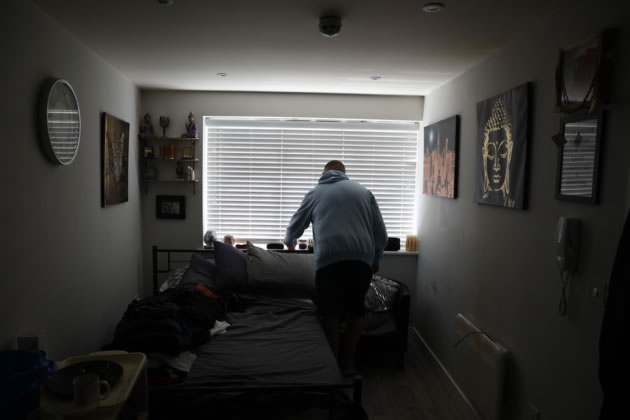
Paul Philpoot in the room the landlord charges £1,200 a month for.
Picture: Facundo Arrizabalga/MyLondon
Both Paul and Steve, who are with different landlords, independently described staff at their offices as ‘rude’ and ‘aggressive’. “It’s like they look down on you because you are in one of their properties,” Steve said, “they could not believe I had a law degree.”
A spokesperson for The Maple Group, which Paul is a tenant of, said, “Firstly, we want to clarify that we do not manage the lettings process ourselves. Instead, we work with a reputable third-party letting agency that conducts thorough vetting processes for all potential tenants. This ensures that the tenants we house meet all necessary criteria, including safety and suitability.
“We are encouraged by local councils to accept tenants who receive benefits, which many landlords are hesitant to do, and as a result we must put in significant amount of extra work to be able to accommodate this. We work closely with local authorities to ensure that we do not house individuals who require supported accommodation beyond our capability. The tenants we accept go through a rigorous vetting process to ensure they are suitable for our properties.
“We do not discriminate against individuals based on their need for assistance or their receipt of benefits. On the contrary, we strive to support the community by providing housing options for all eligible individuals, including those who may require additional support. We liaise with various local councils, to source tenants and ensure that their needs are appropriately met.
“As for claims of increased anti-social behaviour and crime, it is crucial to approach such matters with evidence and clarity. We are committed to contributing positively to the community and work closely with local authorities to ensure our properties are managed responsibly.
“We take allegations of safety issues very seriously. We handle maintenance requests and safety concerns promptly. If a tenant has experienced delays or insufficient responses, we encourage them to reach out directly to our office so we can address the matter immediately, as we don’t seem to have an outstanding maintenance task with a description relating to your mentioned safety concern.”
SHP has been contacted for comment but has not responded.
Since crime and anti-social behaviour have become so noticeable to those the LDRS spoke to in Perivale, with many blaming the increasing presence of HMOs, residents have begun looking into why the area is such a target for investors. One person helping the Medway Village Residents Association is Alex Nieora who is helping concerned residents to challenge the council.
He has described Perivale and Medway Village in particular as having a ‘perfect storm’ of factors for the rise of HMOs in the area. “It is at the very outer edge of the inner West London housing benefits zone,” he explained.
“The rent is calculated as an average across that whole area but because Perivale is furthest out from the centre, housing prices are the cheapest and rent prices are normally the cheapest but the housing benefit is paid at the same rate across that whole area. So housing benefit is going to be way above market rent and that allows the landlords who are charging rent to claim back housing benefit way above the market rent.
“That’s what is incentivising so many landlords to buy up properties in Perivale. Plus the ample supply of 1930s semi-detached homes which lend themselves very easily to HMO conversions. So there is a perfect storm really.
Mr Nieora said the residents’ association is pushing for the introduction of an Article 4 direction would mean a developer would have to apply for planning permission to convert a property from a family home into a HMO. This would mean the creation of new HMOs would face far more scrutiny.
An Ealing Council spokesperson said, “On houses of multiple occupation (HMO) licensing, we cannot take the action that many residents have told us they want and remove these licenses from properties, because we must act according to national legislation. If we don’t, we would be open to legal challenge with the likelihood of significant costs being awarded against us, and the revocation of the licences would be overruled.
“We are not legally able to implement a blanket ban on new HMO licence applications in certain areas either. Our licensing schemes state that property licence holders and managers must take action to prevent or reduce crime and anti-social behaviour by people occupying or visiting the property.
“We are in regular contact with all HMO property licence holders and managers where tenants are reported to have caused concern. We follow up on every evidenced issue which is reported to us. Currently all property licence holders and managers are engaging properly with us, in line with the conditions of their licenses.
“We are currently finalising our research and evidence base to be presented to planning committee in the autumn to support the introduction of an immediate and/or non-immediate Article 4 direction to remove the permitted development right to change of use from dwelling house to small HMO up to six occupants.”
Rory Bennett - Local Democracy Reporter